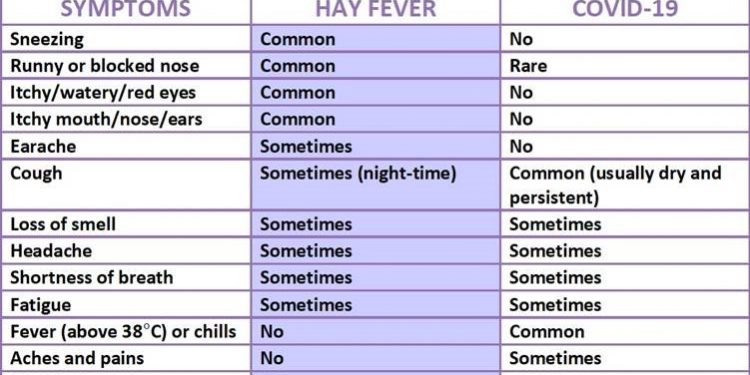Know the Difference between Hay Fever and COVID-19 Symptoms – Pharmacists issue Advice
- 1 in 5 of the Irish population suffers from hay fever
- Preventative steps will help minimise hay fever suffering – advise pharmacists
IPU, 20 April 2020: As hay fever seasons begins, the Irish Pharmacy Union (IPU) has issued advice on recognising the difference in symptoms between hay fever and COVID-19. With one in five Irish people living with hay fever, it is important that people understand how to recognise the key differences; for example, a fever or chills is common with COVID-19 but isn’t seen in those suffering with hay fever.
Hay fever, also known as seasonal allergic rhinitis, is caused by pollen and spores creating an allergic reaction affecting the nose and sinuses. While it can occur at any time of year, sufferers are particularly impacted from the early summer until autumn.
Ann-Marie Horan, a community pharmacist and Executive Committee member of the IPU, highlighted that sufferers need to be particularly cognisant of one particular hay fever symptom, “As anyone who experiences hay fever will know, itchy eyes can be one of the most frustrating symptoms. However, one of the most important things health officials are advising to protect against COVID-19 infections is to avoid touching our faces. This underlines the importance of staying on top of hay fever symptoms by consistently taking any required treatment.”
Hay fever can often be effectively managed with a range of treatment options, including antihistamines, decongestants, corticosteroid nasal sprays and anti-allergy eye-drops. The key to treating hay fever is finding the treatment that works for you. Pharmacists are highly trained health professionals and experts in medicines and can play a significant role in the management of allergies, including hay fever.
“Obviously, during the current pandemic people should only make essential journeys, and for some, including the over-70s, those with underlying health conditions, and people who have either symptoms or a diagnosis of COVID-19 (or a member of their household does), they should not leave their homes. However, you can still phone your pharmacist for advice, and medicine delivery options may be available for those who must stay at home.”
Ms Horan added, “With everyone on high alert for COVID-19 symptoms, it can be difficult to rationalise which symptoms could be hay fever, and which are associated with COVID-19. The below graphic illustrating the differences is very useful.”
Ms Horan also provided some general advice on managing hay fever: “Sufferers should monitor the pollen forecast and take particular care when the count is high. You can reduce hay fever symptoms by doing the following:
- Keep doors and windows closed at home and when driving;
- Apply a little Vaseline inside the nose to trap pollen and stop it being inhaled;
- Wear sunglasses, preferably wraparound glasses which prevent pollen entering the eyes;
- Don’t mow the grass and avoid working in the garden;
- Don’t dry clothes outside if avoidable; and
- Wash your hair, hands and face when you come back indoors and change your clothes to get rid of any pollen.”
Pharmacists also warn that as hay fever is a significant trigger for asthma, asthma patients should ensure they carry their inhaler at all times and use it as prescribed.









